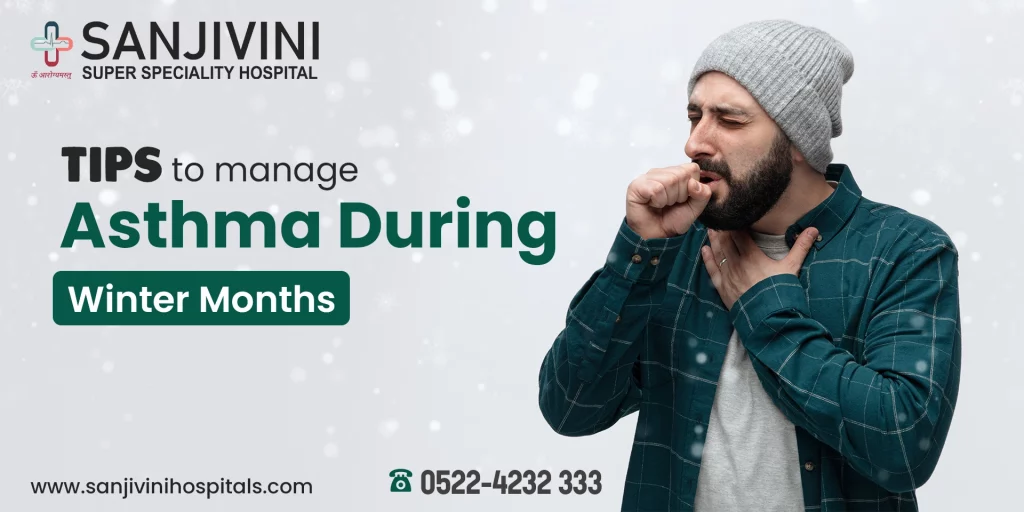Winters can be challenging for people with asthma. It can make asthma worse, and sometimes, it can even lead to fatal asthma attacks. Those who spend a lot of time outside in cold weather or live in places that are cold, dry, moist damp, and dusty may face worsening asthma. Here are some simple tips to manage asthma during the winter months. Let’s make our asthmatic lungs healthier.
Why is winter worse for those with asthma?
Winter can have a significant impact on asthma, as cold, dry moist damp, and dusty air can trigger asthma symptoms and flare-ups. Some key factors contributing to the worsening of asthma during winter include:
- Exposure to Dry Cold air
Dry Cold air evaporates the protective fluid in your lungs, leaving your airways more likely to get irritated and inflamed. This can be a problem in damp climates due to exposure to dusty air too so it’s important to take your inhalers and nebulizer regularly. You should be in regular touch with your pulmonologist and should not stop or change your medicine on your own
- Indoor allergens
Spending more time indoors during winter months can expose individuals with asthma to indoor allergens like dust mites and mold, which can trigger asthma.
- Exercise
Walking in the park is good for you, but when it’s cold outside, persistent exposure to cold air can make your lungs feel tight and congested causing cough and difficulty breathing. That’s why it’s important to be mindful of the ambiance when you exercise.
- Respiratory illness
In winter, respiratory viral infections tend to increase, which can trigger your asthma. So asthmatic patients need to be vaccinated regularly as per schedule.
How does the weather trigger asthma?
Exposure to cold/dusty/moist/damp weather changes irritates airways, causing inflammation, swelling, and muscle spasms of your windpipe, worsening asthma symptoms like chest tightness, coughing, and shortness of breath, as explained by Dr. S.N. Gupta, the highly esteemed and experienced pulmonologist at Sanjivini Super Speciality Hospital Lucknow. In winter, fluctuating temperatures and transitioning between cold outdoor and heated indoor air can exacerbate these symptoms. Dr. Gupta emphasizes that extreme temperature shifts, not just cold weather, can trigger asthma, cautioning that even winter getaways might reintroduce allergy triggers. It’s essential to be aware that hot, humid climates can also provoke asthma flare-ups, debunking the notion that allergens take a break during freezing temperatures.

How can you manage asthma differently in the winter?
Here are the Tips to Manage Asthma during winter:
- Stay Informed
People with asthma need to know the dangers of winter because cold, dry air can make their asthma worse. Also, things like indoor allergens like dust and smoke viruses, exercising in cold air, and pets Dogs, and cats can trigger asthma symptoms. To help them stay informed, we can give them tools to check air quality and get weather updates.
- Regular Medication Check
Regularly reviewing medication is crucial for patients to confirm their adherence to prescribed medications and detect any possible issues or side effects. Healthcare professionals can arrange medication assessments with patients to evaluate their medication therapy and enhance therapeutic outcomes.
- Update Asthma Action Plans
Review and update personalized asthma action plans, and ensure understanding of winter-specific scenarios.
- Diet Modification
Less exposure to chilled or sour food items and have a high protein diet.
- Bundle Up
In winter, those with asthma must dress appropriately before stepping outside. Staying warm is key to minimizing the risk of asthma flares. Adjust your attire according to the outdoor temperature—opt for a cozy coat, scarf, hat, and gloves during the colder months.
- Avoid Mouth Breathing
If you have asthma, avoid mouth breathing in cold weather to prevent triggering attacks. Opt for nasal breathing, which warms and humidifies the air, reducing the risk of irritating your airways.
- Manage Stress and Avoid Smoke
Minimize stress and steer clear of secondhand smoke to lower the chances of asthma flare-ups.
- Wash Hands and Stay Healthy
Maintain good hygiene by washing your hands regularly and ensuring ample rest to minimize the chances of respiratory infections.
- Get Vaccinated
Get your flu and pneumonia shots before winter to lower the chances of respiratory infections and asthma issues.
- Indoor Allergen Control
Improve indoor air quality and minimize asthma triggers by incorporating HEPA filters and dust mite covers. These measures effectively reduce allergens such as dust mites and mold in your living space.
- Proactive Measures
Stay well-hydrated by drinking ample water, always have your inhaler on hand when venturing outdoors, and proactively use a rescue inhaler before engaging in outdoor activities to effectively manage asthma symptoms during colder weather.
- Avoid winter asthma triggers
To reduce exposure to potential triggers, follow these steps:
Wash your bedding weekly in hot water.
Avoid having pets in the bedroom.
Delegate dusting and vacuuming tasks to someone else.
Employ allergen covers on mattresses and pillows.
- Use a humidifier indoors
Ensure you use a humidifier indoors, particularly while sleeping at night. and use room heaters with oil.
- Avoid outdoor firepits
If you own an indoor fireplace, ensure it remains unlit when not in use. Steer clear of outdoor fire pits, or maintain a comfortable distance.
Dr. S.N Gupta emphasizes the crucial step of safeguarding yourself against influenza and pneumonia infections by opting for well-established and easily accessible vaccines. According to him, there has been a notable increase in influenza cases, and it’s advisable to get immunized without delay which has high protective efficiency in adults as well as in children against
Discover effective winter asthma management strategies by scheduling a consultation with Dr. S.N Gupta at Sanjivini Super Speciality Hospital Lucknow. Call us or conveniently book your appointment online now.


Pingback: 15 Tips to Manage Asthma During Winter Months |...